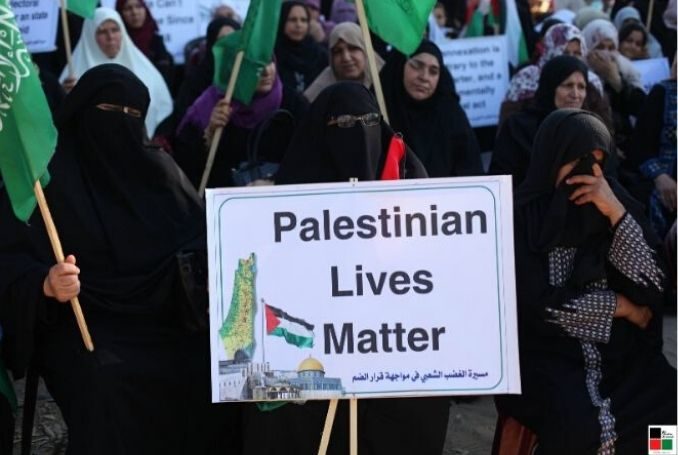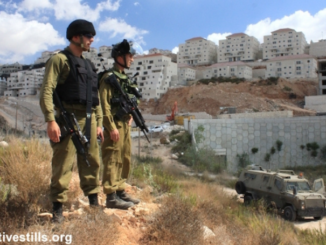
By Benay Blend
In an American History class that I taught at the local community college, a student made a comment that has stayed with me all these years. To paraphrase, he explained that if Native Americans had just accepted their colonized position without fighting back, there would have been no massacres of Indians.
That refusal to recognize the right of the colonized to resist makes its way into contemporary thinking, including the supposedly well-informed. Very often there is no context, no background history to explain why the oppressed resist. Instead, the journalist, academic, or whoever is speaking describes any opposition to the established order as “barbaric,” “uncivilized,” a “subhuman” who has gone on a rampage for no reason.
For example, Maureen Clare Murphy, writing for Electronic Intifada, reported that on May 5, 2022, two Palestinians allegedly murdered three Israelis and injured two others in the city of Elad. In her article, Murphy puts the incident into the context of rising tensions over increasing Israeli provocations during Ramadan, all of which led up to illegal settlers storming Al Aqsa Mosque on Israeli Independence Day.
The 16th October Group, a collective of young journalists and activists in the Gaza Strip, explained more clearly that the attack came “as a response to the Israeli occupation violations in the Al-Aqsa Mosque,” and moreover, noted that El’ad, the location of the incident, is an illegal settlement in “1948-occupied Palestine.”
Coverage by even the liberal Western media was not so generous. For example, National Public Radio (NPR) merely repeated news from the Associated Press. According to this account, two Palestinian “attackers” went on a “stabbing rampage near a town in Tel Aviv” on Thursday night,” adding to “the latest in a string of deadly attacks in Israeli cities in recent weeks.”
There is very little context, no reference to 74 years of ongoing Nakba. Instead, events leading up to May 5th are described as “clashes” for which Palestinians were mainly responsible. The only Palestinians quoted were President Mahmoud Abbas, who said that the attacks only led to increased instability, and Hamas spokesman Hazem Qassem, who described the stabbings as an act of resistance.
There is no mention in the article of how Israel might be instigating the resistance, no mention of increased settlement building, illegal settlers who have provoked Palestinians to respond, and no mention of the overarching cause: settler-colonial occupation.
Also very seldom mentioned, under international law, the occupier has a responsibility to protect those under occupation, not ethnically cleanse and displace them. Moreover, international law ensures the right of “armed struggle” for peoples who seek self-determination under “colonial and foreign domination.”
Indeed, United Nations resolution 37/43, dated 3 December 1982, “reaffirms the legitimacy of the struggle of peoples for independence, territorial integrity, national unity and liberation from colonial and foreign domination and foreign occupation by all available means, including armed struggle.”
As Noura Erakat explains, a state cannot claim control over another group of people while at the same time attacking that group of people by “claim[ing] that it is ‘foreign’ and poses an exogenous national security threat.” Nevertheless, Israel repeatedly claims the right to defend itself, a reversal of facts on the ground that is often picked up by Western media.
Historical contortions that transform the victim into the cause of their own victimhood are not new. In 1831, Nat Turner, an enslaved man in Southampton County, Virginia, organized others to go from plantation to plantation, murdering at least 55 men, women, and children. Howard Zinn described this as “rampage” (A People’s History of the United States, 1980, p. 74) which perhaps was correct. But it was also a rebellion which, despite the aftermath of collective punishment, showed slaveowners that their “property” would not acquiesce.
More recently, Martin Luther King is more often honored than Malcolm X, perhaps because the dominant population feel less threatened by a religious leader who preached nonviolence that a fiery orator who believed in self-defense. This does not diminish the courage of either man; indeed, as MLK became increasingly vocal against the Vietnam War abroad and poverty at home, he became a target of the Federal Bureau of Investigation (FBI). Rather, it illustrates that certain kinds of resistance tend to get written about more favorably than others.
In that vein, Whitney Webb explores how Biden’s new “domestic terror” agenda targets “primarily those who oppose US government overreach and those who oppose capitalism and/or globalization.” Far from being a war against “white supremacy,” the administration’s new “domestic terror” strategy clearly targets “primarily those who oppose US government overreach and those who oppose capitalism and/or globalization.” While ostensibly aimed at reducing racially motivated violence, it equates those labeled “anti-government” or “anti-authority” with “racist extremists,” and lists policies that could be construed to “silence or even criminalize online criticism of the government.”
“If you just shift through the noise,” warns Erica Ryan, organizer for Black Alliance for Peace, “you realize all of the rhetoric is about repressing protesting and when you take that into context alongside the multiple states that have passed anti-protest laws, and the federal increase of policing on top of the collapsing infrastructure—what you are expected to do is grin and bear it with the occasional ‘angry tweet’…not organize to act.”
Finally, Ilan Pappé describes the hypocrisy behind Western media reporting on the Ukraine/Russia conflict. Careful not to diminish the humanitarian suffering for victims of any war, Pappé notes that in the past Western media warned about the danger of increasingly powerful neo-Nazi groups in Ukraine. Nevertheless, as a by-product of increasing Russophobia, the same media now whitewashes these neo-Nazi groups, thereby ignoring their recent past in Ukrainian history but also what he calls their present danger for “Europe and beyond.”
Pappé concludes with a reminder that the West reserves its support for any country willing to support its aims, preferably white, European countries or those who have adopted a Western outlook. As for the Palestinians, they do not seem to meet these qualifications, so when they resist the occupying state they are reduced to Orientalist stereotypes of savages who sometimes go on a rampage with no apparent motive for their actions.

– Benay Blend earned her doctorate in American Studies from the University of New Mexico. Her scholarly works include Douglas Vakoch and Sam Mickey, Eds. (2017), “’Neither Homeland Nor Exile are Words’: ‘Situated Knowledge’ in the Works of Palestinian and Native American Writers”. She contributed this article to The Palestine Chronicle.







